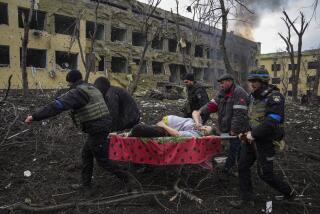TV Reviews : A Promising ‘Second Russian Revolution’
- Share via
Making a meticulous, comprehensive documentary about the fast-changing Soviet Union would seem to be about as promising as a dog chasing its tail. It’s nearly impossible to catch up.
Yet “The Second Russian Revolution” just about succeeds, weaving its 18 months of interviews and other research into a tight historical narrative that exhaustively defines the Mikhail Gorbachev era right up to the recent coup d’etat that sought to bring him down.
Scholars and astute political observers galore are listed as advisers for this important series. That it’s airing five consecutive evenings on cable’s Discovery Channel--starting at 6 Sunday with two hours that will be repeated at 10--indicates how far behind ABC, CBS and NBC have fallen in providing context and meaning to these remarkable times in the Soviet Union.
A co-production with the BBC, “The Second Russian Revolution” continues at 7 p.m. Monday through Thursday, with crews having returned to the Soviet Union just recently toexpand the already completed final episode to cover the coup and its aftermath.
As originally crafted, each episode examines a year of the Gorbachev age. But Sunday’s premiere merges two of these hours, the first chronicling the bitter political infighting from which Gorbachev emerged as general secretary of the Communist Party in 1985, the second a look at both the public and private battles underpinning glasnost.
It is here that we see the dominoes of secrecy and repression start to fall. Yet this same portion also shows, in chilling fashion, how details of the Chernobyl disaster were initially squelched despite an official policy of openness.
The rise and fall and rise of Boris Yeltsin, and his intense rivalry with rigid deputy party leader Yegor Ligachev along the way, dominate Monday’s episode. Ligachev is captured here making an evaluation of Yeltsin--as being a man of “all talk” and no achievement--that has turned out to be somewhat premature. Now president of Russia, Yeltsin has proved himself a shrewd, charismatic, media-savvy politician whose resistance to the coup turned him into a superhero.
Because it so heavily relies on talking heads--and simultaneous English voice-overs--the series is spotted by patches of aridness that make great demands on your powers of concentration. Just getting the cast of characters straight can be a chore.
In many ways, however, these interviews of present and past Kremlin insiders and others are not only fascinating, but also astonishing. Skillfully juxtaposed, they become an open debate about Soviet inner workings, the likes of which would have been unthinkable only a few years ago.
Some doing the talking have since fallen hard, among them Sergei Akhromeyev, the former armed forces chief and Gorbachev military adviser who committed suicide after the failed coup. You wonder about the fates of others in this period of landmark change and turbulence.
More to Read
The complete guide to home viewing
Get Screen Gab for everything about the TV shows and streaming movies everyone’s talking about.
You may occasionally receive promotional content from the Los Angeles Times.






